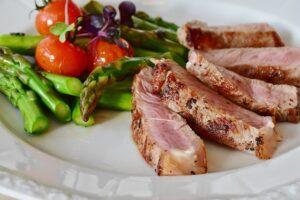Let’s dispel misconceptions about animal husbandry and meat consumption!
The National Chamber of Agriculture and the Association of Hungarian Livestock Breeders consider it a priority task to create balance in the debates surrounding the livestock sector, as well as to restore the respect of farmers and product producers operating in the sector. This is also the purpose of the 37-episode video series, which, through interviews with international experts, provides a new perspective on misconceptions about animal husbandry, animal product production, ecology, ethology, and nutrition science. The videos available with Hungarian subtitles on NAK’s website have been viewed by several thousand people.

(Photo: Pixabay)
In July, a new category was added to the professional videos sub-page available on the website of the National Chamber of Agrarian Economy (NAK). A total of 37 video interviews with 10 international experts who signed the Dublin Declaration and published by the European Livestock Voice, a group of like-minded EU partners active in the livestock food chain, were included in the Facts/Misconceptions – Animal Husbandry subcategory. In the series of interviews with Alice Stanton, a staff member of the Irish Royal College of Surgeons, sensitive questions such as the role of meat in our diet and the risks of a meat-free diet in childhood are discussed, but the expert also answers the question of whether red meat is really to blame for for the development of cancer, obesity and cardiovascular diseases.
Frederic Leroy, professor at the Vrije University in Brussels, introduces the viewers to the details of the so-called Dublin Declaration, and also talks about who feeds the anti-meat narrative, and why it is important to involve experts from various social sciences and humanities in the debate about meat?
Nutritionist Diana Rodgers, member of the Global Food Justice Alliance and Sustainable Dish, points out, among other things, the role animal husbandry plays in the life of rural society, the environmental benefits it brings, and outlines what the world would be like in the series of interviews conducted with her, without animal husbandry. In the video series, Theo De Jager, former president of the World Farmers’ Organization (WFO), answers the question of what paradoxes are hidden in EU strategies and policy materials, and how the EU can help Africa to farm more sustainably. Pablo Manzano, a colleague of the Basque Climate Change Center and the University of Helsinki, analyzes the effects of animal husbandry on climate change, but also points out the dangers of simplistic approaches represented by public opinion. John Gilliland, a colleague of Queen’s University in Belfast – who is also the director of Devenish Nutrition Ltd. – in the series of interviews with him, talks about the importance of biodiversity and soil health, among other things, and points out why it is important to improve the communication of the livestock industry and to have a dialogue with the public about their concerns about agriculture. Among the topics raised by Candace Croney, a colleague of Purdue University in the United States, is the moral judgment of meat consumption, the nutritional value of plant-based foods, but in the interview she also discusses why it is harmful to endow animals with human characteristics. Max Makuvise, an employee of the E-Livestock Global organization in Zimbabwe, guides the interested parties to the African continent in the series of interviews with him. The specialist shows how animal husbandry supports the strengthening of the socio-economic role of young people and the emancipation of women in Africa; what is the economic value of animals, and how sustainable farming can be carried out on the continent. Wilhelm Windisch, a colleague of the Technical University of Munich, explains, among other things, how animal breeding creates a beneficial situation for the consumer, the animal keeper, agriculture and other industries. It also draws attention to the important role that farmers play in the proper implementation of the EU’s strategy from producer to consumer. The series of interviews with Neil Mann, a colleague of the University of Melbourne, discusses the role of meat in human evolution, the health risks of extreme diets and radical diets, and the problems associated with replacing animal-based foods with plant-based alternatives.
All the interviews with international experts – subtitled in Hungarian – are available in the Facts/Misconceptions – Animal Husbandry video subcategory on the NAK website.
The National Chamber of Agriculture and the Association of Hungarian Livestock Breeders consider it a priority task to create balance in the debates surrounding the livestock sector, as well as to restore the respect of farmers and product producers operating in the sector. To achieve these goals, the presentation of the materials of the campaign launched by the Voice of European Animal Husbandry organization, founded in 2019, at various professional events, as well as the publication of video interviews with internationally recognized experts uploaded to the Facts/Misconceptions – Animal Husbandry video subcategory, with Hungarian subtitles, prove to be an effective communication tool for achieving these goals. The importance and necessity of the communication campaign launched by the organization on the subject is unquestionable, which is supported by the high number of visitors we experienced when we went to professional events, the positive feedback, as well as the download and viewing numbers achieved in the case of the professional content published on our web interfaces. The communication campaign did not end there, NAK continues to strive to contribute to the recognition of the work of not only the domestic but also the European livestock industry, the millions of European farmers, to emphasize the role of animal products in a balanced diet, to increase awareness, to correctly inform consumers and political decision-makers. According to their hope, through the constantly expanding, thought-provoking professional content based on scientific facts, they will be able to create an opportunity for the development of a healthy dialogue between the actors involved in the subject, who in many cases have different views, and also to offer new perspectives on the ongoing research in relation to the livestock industry and products of animal origin. for discussions.
NAK
Related news
European Court of Auditors: EU Commission proposals affecting the common agricultural policy may cause uncertainty
🎧 Hallgasd a cikket: Lejátszás Szünet Folytatás Leállítás Nyelv: Auto…
Read more >Walnuts are available at incredible prices
🎧 Hallgasd a cikket: Lejátszás Szünet Folytatás Leállítás Nyelv: Auto…
Read more >Related news
NKFH: inspections focus on discount prices and customer deception
🎧 Hallgasd a cikket: Lejátszás Szünet Folytatás Leállítás Nyelv: Auto…
Read more >









